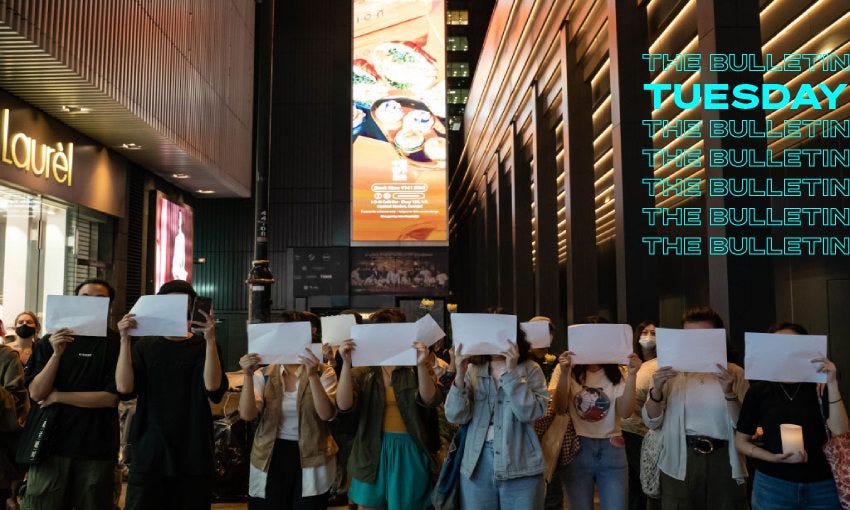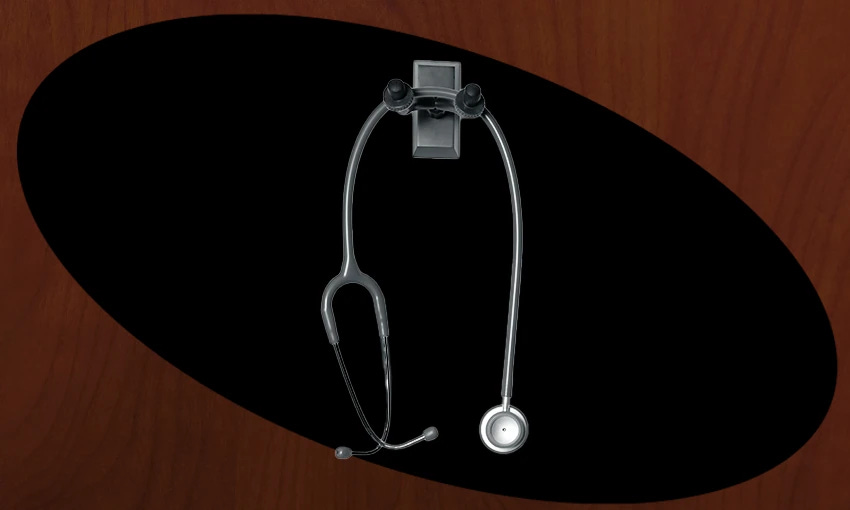The spectre of Covid policies past and present
Protests against China’s Covid-zero policy continue as cases rise here. Across the Tasman, the National party is banking on the ghosts of Covid policy past to lift its share of the overseas vote
Mōrena and welcome to The Bulletin for Tuesday, November 29, by Anna Rawhiti-Connell. Presented in partnership with Z Energy.
In today’s edition: Retirement Commission recommends retirement age stay at 65; report shows influence bought through political donations; the government’s multi-million dollar crime prevention package but first; the significance of the protests in China and the opposition’s bid to lift its share of the overseas vote
People hold sheets of paper in protest of Covid restrictions during a vigil in the central district in Hong Kong, China. (Photo by Anthony Kwan/Getty Images)
“A single spark can start a prairie fire”
As Covid cases in New Zealand rise and we continue to live with almost no restrictions, the protests against the Chinese Communist Party’s Covid-zero restrictions that have broken out in China are a reminder that the pandemic is still highly consequential. Editor of the Dominion Post and former Beijing bureau chief for the Washington Post Anna Fifield, has an excellent piece explaining what’s happening in China right now. Citing both a line from Mao Zedong (“a single spark can start a prairie fire”) and The Economist, Fifield pinpoints exactly why these protests are so significant.
China’s immunity gap
China now largely stands alone in the world in its pursuit of a zero-Covid strategy. Its approach has meant most people haven’t been exposed to the virus and while vaccination rates are high overall (90%), only 65% of those over 80 are vaccinated. Since the beginning of the pandemic, it’s also had a policy of only using domestically-produced vaccines which were developed using the original strain of the virus. The Washington Post has a good outline of the immunity issue. Isabel Hinton offers some political framing in the Guardian, writing, “It is difficult to reverse policy in any political system, but it is perhaps hardest in a top-down authoritarian model… if the leader is strongly associated with it [the policy], as in this case, a U-turn implies failure – something leaders who seek to maintain a myth of omniscience and omni-competence find difficult.”
Tourism and trade implications for New Zealand
Bernard Hickey noted on Twitter that China is our largest trading partner and Australia our second. China is also Australia’s largest trading partner. Economic dominoes. Pre-pandemic, Chinese tourists were our second largest source of visitor revenue and third largest in terms of arrivals. Tourism minister Stuart Nash said last week it could be 2024 before visitors from China return to our shores due to the country's Covid-zero policy. Deutsche Bank has said that China will not reopen until late Autumn 2023, and until then, it sees China’s growth stagnating. A new report from the New Zealand-China Council is advising businesses to consider exporting digital services noting the hit education and tourism have taken because of China's Covid-zero policy.
Opposition courting overseas voters off back of Covid border closures
With the one-year anniversary of the end of last year’s Auckland lockdown approaching this week, and despite the consequential impacts of what’s happening in China, it can feel like some aspects of the pandemic are a distant memory. Not so for the opposition who, according to this report from the Melbourne Age, are looking to tap into the disillusionment felt by New Zealanders overseas when our borders were closed. Three National party frontbench MPs arrived in Sydney on Sunday night and addressed Kiwis living in Australia at the Liberal party headquarters last night. Traditionally, overseas votes tend to swing to the left but Chris Bishop, who is chair of the party’s 2023 election campaign, told The Age that “our goal for 2023 is to change that.”
This is business banking for better
Kiwibank wants more Kiwi businesses implementing sustainability initiatives to help reduce their carbon footprint – but they know how hard – and expensive – that can be. So they’ve created the Sustainable Business Loan with preferential internet rates, to make it more affordable for businesses to make a positive impact.Find out more about the Sustainable Business Loan here. Sustainability & lending criteria, terms & conditions & fees apply. (Sponsored)
Retirement Commission recommends retirement age stay at 65
In a departure from advice from her predecessors, Retirement Commissioner Jane Wrightson says New Zealanders aren't wealthy enough to cope with a higher pension age. The Retirement Commission makes policy recommendations to the government every three years. Wrightson said 40% of people aged 65 and over had virtually no other income besides NZ Super. “Even with NZ Super, close to one in three people don’t think they will have enough for retirement unless they continue working past 65,” she said. “Any increase to the age of people accessing NZ Super will only further disadvantage women, Māori, and Pacific People,” said Wrightson.
Giving tens of thousands of dollars makes it easier to get meeting with ministers
A new report from researchers Max Rashbrooke and Dr Lisa Marriott looking at political party funding has recommended greater transparency and capping individual donations at $15k annually. As the NBR’s Brent Edwards reports (paywalled) the report reveals repeated instances of parties obscuring the source of their funding through sham donors, complex corporate structures, and other methods. Donors spoken to acknowledged they gave money to parties to advance their own interests and that giving tens of thousands of dollars made it easier to get a meeting with ministers. The report said compared with other countries, New Zealand had not imposed particularly tough regulations on political donations.
Multi-million dollar crime prevention package
Yesterday, cabinet signed off an additional package to assist small businesses in dealing with crime. The package included a new $4m fund to support local council crime prevention programmes, an expansion of the Retail Crime Prevention Fund introduced in May this year, and a $4,000 subsidy for small shops and dairies to install a fog cannon if they choose. It was announced by the prime minister Jacinda Ardern. Given the recent focus on youth offending, Ardern also noted that 92% of retail offending is committed by adults. Stuff’s Sinead Gill reports on claims of rising crime in Christchurch this morning. Canterbury metro area commander Superintendent Lane Todd is pushing back, saying the claims are backed by “nothing evidential”. The most recent crime statistics were on par with pre-Covid levels, if not lower, when adjusted for the population increase since 2018.
Click and collect
Prime Minister and Leader of the House not aware of move to entrench a part of the Three Waters legislation despite official advice provided more than a year ago that warned the original proposal could be constitutionally damaging
Changes coming to police pursuit policy
Election complaint against Christchurch mayor Phil Mauger in the hands of police
Brian Tamaki’s Freedom NZ applies for formal party registration
Cooling our collective jets - Black Friday spending down
Let’s try this one again: the link to yesterday’s story about the gender pay gap wasn’t quite right (user error on my part) but women in New Zealand have now been effectively working for free since yesterday
Got some feedback about The Bulletin, or anything in the news? Get in touch with me at thebulletin@thespinoff.co.nz.
If you liked what you read today, share The Bulletin with friends, family and colleagues.
A New Zealand GP explains why she's handed in her notice and is leaving to become an Australian GP. Nadine Anne Hura explains what living with baby starlings has taught her about the true costs of climate change and the conscience of those who wield all the power. Suraya Sidhu Singh details the moral problem with turning passenger rail into an exclusive luxury. Claire Mabey reviews a new film that attempts to unravel what may have inspired Emily Brontë’s batshit gothic classic.
Black Caps will remain top of the ICC ODI rankings even if today’s match is rained off
After Sunday’s game in Hamilton was abandoned due to rain, the Black Caps are hoping to get some play in in Christchurch today despite forecast showers. As Stuff’s Ian Anderson reports, no matter what the result against India today, New Zealand will remain at the top of the ICC ODI rankings as they look ahead to next year’s World Cup in India.
Where and who is getting buzzed?
If you live in Auckland and belong to a local Facebook group, you will have seen the 1am complaints about the police chopper, known as the Eagle. They can lead you to believe it buzzes over your neighbourhood more frequently than anywhere else in the city. Stuff’s Kate Newton has decided to settle it once and for all with this incredible piece of data work that analysed four months of police helicopter flight data to track where the chopper goes and what it does. Newton dives into the health consequences of the noise disturbance and the discrepancies between visits, areas of deprivation and crime rates. My own local Facebook group was abuzz about Newton’s piece yesterday.











